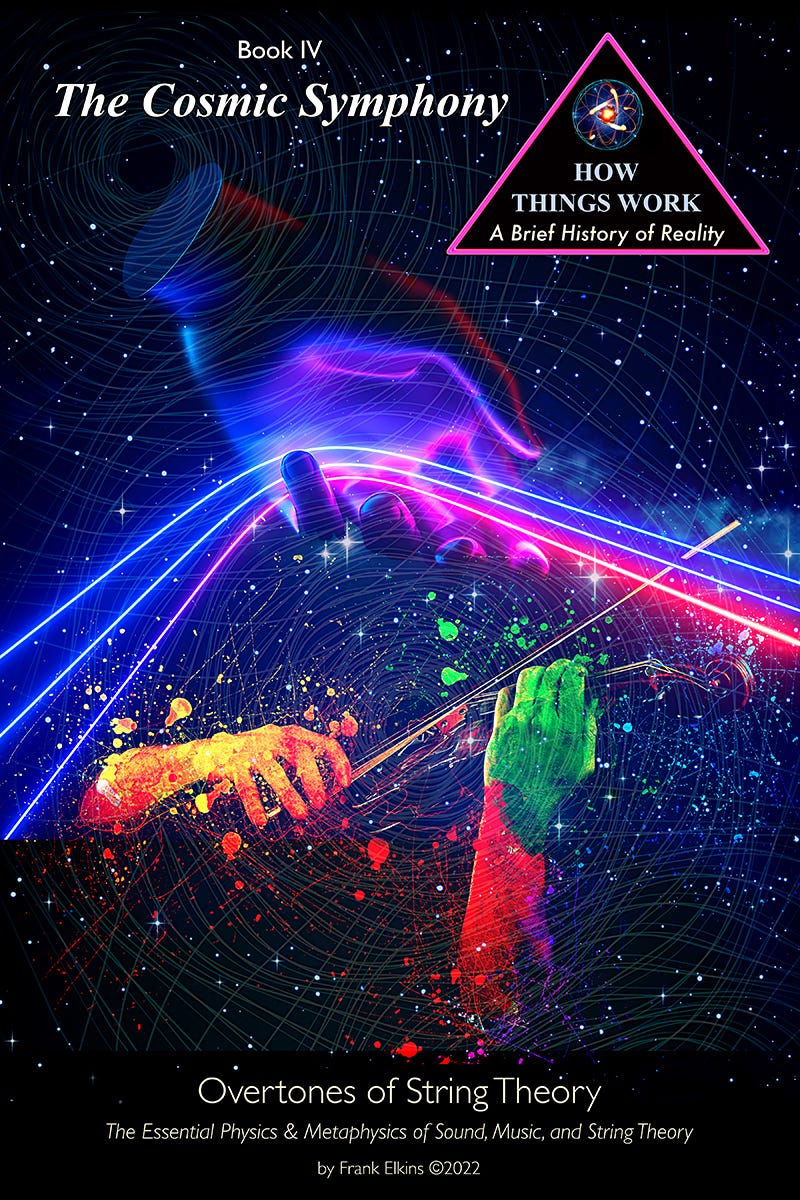The Gospel of John & The Logos
How Things Work – Consideration #133 (Book II Science & Religion)
Be A Part of the Conversation!
Tuesday April 30, 2024
“Listening not to me but to the logos it is wise to agree that all things are one.”
– Heraclitus (500 BCE)
PREFACE
Welcome Everybody!
The Gospel According to John is probably the only Gospel written by an actual follower of Jesus during his lifetime. It is accredited to John “the beloved disciple of Jesus,” and was likely written between 90-110 CE in Ephesus (Turkey) at a time when Jewish leaders were banning Christians from the synagogues. John focuses on a strong, noble, powerful, divine Jesus, who despite appearances, is always in control of his own destiny. John’s perspective of Jesus is so unique from the other Gospels that it almost did not make it into the Bible at all. However, once in, it became the favorite Gospel of many Christians.
“…the miracle of John’s Gospel is Jesus himself.”
If the synoptic gospels are considered to be the narrative of Jesus, the Gospel According to John is his proclamation! John portrays an incredibly spiritual, confident, transcendent Jesus revealing himself openly and being recognized almost immediately by most people. The overwhelming spiritual aura of Jesus permeates every aspect of John’s recollection; the miracle of John’s Gospel is Jesus himself.
Jesus is not here for the Jews, or the Gentiles, or even the Samaritans; Jesus is here to save the entire world. The Gospel According to John is an extremely personal account of Jesus’ ministry: revealing the innermost secrets of the living word.
John’s gospel opens with a complex and intricate Christian theology going back to the birth of reality itself called The Logos.
“In Greek philosophy, the logos remains an impersonal force, a lifeless and abstract philosophical concept that is a necessary postulate for the cause of order and purpose in the universe. In Hebrew thought, the Logos is personal. He indeed has the power of unity, coherence, and purpose, but the distinctive point is that the biblical Logos is a He, not an it...
That the Word became flesh and dwelt among us is the startling conclusion of John's prologue. The cosmic Christ enters our humanity. It is the supreme moment of visitation of the eternal with the temporal, the infinite with the finite, the unconditioned with the conditioned.”
Christianity.com (What is the Logos in the Bible?)
As extensive as our consideration of the synoptic gospels has been, it was an absolute prerequisite before moving into the Gospel of John. John takes everything we have learned about Judaism and Jesus and develops a revolutionary metaphysical manifestation of pure spiritual salvation. In John, Jesus explains everything; to everyone.
John opens with perhaps the most metaphysical and theological abstraction in the entire Bible, starting at the very beginning…
“In the beginning was the Word, and the Word was with God, and the Word was God. He was with God in the beginning. Through him all things were made; without him nothing was made that has been made. In him was life, and that life was the light of all mankind. The light shines in the darkness, and the darkness has not overcome it.”
John 1:1-5
In this very brief, yet very profound opening, John establishes Jesus as eternal, one with God, the essence of how the universe was created, and the light that overcomes the darkness. In John, Jesus becomes God’s intention. Through Jesus everything is created and made, including life. Jesus is also the light of the world, not only in terms of morality, but as the spark of divinity that began the world; with the words “Let there be light.”
Everything began with the word of God; Jesus was the word of God physically incarnated into the empirical world. John uses Jewish tradition and Greek metaphysics to develop a unique form of Christian theology based on a Greek concept known as the logos.
Welcome to the Gospel According to John.
CONSIDERATION: The Gospel of John & The Logos
John goes far past the idea of Jesus as a Messiah, for John, Jesus is everything we can possibly know about God. Therefore, no birth narratives are needed; John’s narrative opens with the birth of everything. The Logos.
Like the synoptic gospels, John begins Jesus’ earthly ministry after his baptism by John the Baptist, but John the Baptist is no longer a traditional Jewish prophet; he is a testament to the light of the word. In John’s gospel, John the Baptist is not proclaiming a traditional Jewish Messiah, he is proclaiming the revelation of God Himself, the physical incarnation of the Logos.
“There was a man sent from God whose name was John. He came as a witness to testify concerning that light, so that through him all might believe. He himself was not the light; he came only as a witness to the light.
The true light that gives light to everyone was coming into the world. He was in the world, and though the world was made through him, the world did not recognize him. He came to that which was his own, but his own did not receive him. Yet to all who did receive him, to those who believed in his name, he gave the right to become children of God — children born not of natural descent, nor of human decision or a husband’s will, but born of God.
The Word became flesh and made his dwelling among us. We have seen his glory, the glory of the one and only Son, who came from the Father, full of grace and truth…
For the law was given through Moses; grace and truth came through Jesus Christ. No one has ever seen God, but the one and only Son, who is himself God and is in closest relationship with the Father, has made him known.”
John 1:6-15
In John, Jesus is more than the Messiah; he is complete spiritual transformation. Jesus transcends the law of Moses through the grace and truth of God. To recognize Jesus, is to recognize God. To understand Jesus, is to understand God. To know Jesus, is to know God. To become one with Jesus, is to become one with God. Jesus was the light of the world, and creation itself.
“The next day John saw Jesus coming toward him and said, ‘Look, the Lamb of God, who takes away the sin of the world!’”
John 1: 29-30
“The man on whom you see the Spirit come down and remain is the one who will baptize with the Holy Spirit. I have seen and I testify that this is God’s Chosen One.”
John 1: 33-34
To this John replied, “A person can receive only what is given them from heaven. You yourselves can testify that I said, ‘I am not the Messiah… He must become greater; I must become less.”
John 3:27-30
“The one who comes from heaven is above all… For the one whom God has sent speaks the words of God, for God gives the Spirit [to him] without limit. The Father loves the Son and has placed everything in his hands. Whoever believes in the Son has eternal life, but whoever rejects the Son will not see life…”
John 3:32-36
Unlike the previous synoptic gospels, the Gospel of John weaves a new Christian theology throughout the entire narrative. From the opening prologue, along with John the Baptist’s proclamation of Jesus as “the Son of God,” it reflects more than Jesus being the fulfilment of a Jewish Messianic prophecy; it reflects Jesus as the physical incarnation of the Logos.
POSTSCRIPT
In Greek philosophy, reason is the essential factor in both physics and metaphysics. The concept of the logos is associated with the concepts of reason, word, and thought. For the Greeks, rational revelations such as “beauty,” “justice,” and the nature of the “Good,” were the fruits of a “divine revelation” manifested through the logos. This concept evolved into other metaphysical incarnations in both Judaism and Christianity.
“The concept of the Logos has had a crucial and far-reaching influence upon philosophical and Christian thought. The term has a long history, and the development of the idea it embodies is really the unfolding of man's conception of God. To understand the relationship of the Deity to the world has been the goal of all religious philosophy. While diverging views as to the Divine manifestation have been conceived, the Greek word logos has been used with a certain degree of agreement by a series of thinkers to express and define the nature and form of God's revelation.”
Christianity.com (What is the Logos in the Bible?)
The logos functions rationally through mind, or thought, and empirically through language, or words. In John’s connotation of the logos Jesus functions rationally through the “Holy Spirit” and empirically through the divine revelation expressed through his words and actions, making Jesus the physical incarnation of the Logos.
In fact, John directly equates Jesus with “the word” that generated the universe; similar to the Greek understanding of “First Cause,” or “Unmoved Mover.” In Genesis God “speaks” reality into existence with His Words: “Let there be Light…” John then directly connects Jesus to that “light” as the “light” of mankind that overcomes the darkness.
“In many Eastern meditations the concept of the logos is reflected through the intonation of the word, Ohm…”
In string theory, the universe is ultimately composed of vibrations. One connotation of the logos reflects the idea that the universe was manifested through sound, or vibration, as considered by Pythagoras’ in his original catharsis resulting in his “music of the spheres” theory of reality.
In John, God’s words are the original sound that generated the universe into reality and continually maintains its existence. In many Eastern meditations the concept of the logos is reflected through the intonation of the word, “Ohm,” as a device for unification with the cosmos; thus, allowing the meditator to become one with the ultimate vibration of the universe.
Through the Greek concept known as the logos, John connects Jesus directly to God, Eternity, The Word, Creation of the universe, Life, Light, and the Incarnation of God on Earth.
“John’s Gospel begins by using the Greek idea of a ‘divine reason’ or ‘the mind of God’ as a way to connect with the readers of his day, who mostly spoke Greek, and introduce Jesus to them as God. Greek philosophy may have used the word in reference to divine reason, but John used it to note many of the attributes of Jesus.”
Christianity.com (What is the Logos in the Bible?)
John’s use of the Logos to develop a rational narrative of Jesus makes future complex theological considerations, such as the Holy Trinity, possible. It also serves as a major link in connecting a long series of religious traditions such as Judaism, ancient Greek physics and metaphysics, and the culture of the Roman Empire to a radically new perspective of reality called Christianity.
Next week we consider a secret meeting between Jesus and an influential Pharisee named Nicodemus, who is sincerely attempting to understand what Jesus is really trying to say…
Expand the Conversation by Upgrading to “Reality by a Thread!”
Excerpt From This Week’s “Untangling the Knots of Reality” Podcast:
• UNTANGLING THE KNOTS OF REALITY: Podcast #93 – “Untangling Length Contraction”
“How did Einstein shatter our Cartesian perspective of reality?” “How can you empirically measure an object that changes size?” “What is length contraction, and is it real?” “Why would the universe disappear without time?” “Is reality itself, based on relativity?” These are some of the knots we will attempt to untangle in this week’s podcast. That’s a lot of spatial consideration for one podcast! So, let’s get started…
• REALITY BY A THREAD: “AI Axiom #1” (Excerpt) – “This is the most important axiom for controlling and limiting Artificial Intelligence; it is the foundational factor in managing AI behavior and decision making. AI will inherently be a superior intelligence compared to human intelligence; this is why we are developing it. AI is designed to do things we cannot do or do as efficiently. AI will at some point certainly come to understand this. That would essentially leave AI as the dominant intelligence in the universe, or God.”
•FREE PDF DOWNLOADS of Book IV: “The Cosmic Symphony – Overtones of String Theory” plus other Free Books, Discounts and Benefits. Also Gain Complete Access to all Previous Podcasts and Threads!
UPGRADE NOW!
Is The Universe Manifesting a Cosmic Symphony of Everlasting Creation?
“For Pythagoras, music represented much more than just pleasant sounds to our ears; it directly reflected the mathematical perfection of the universe. The entire universe was in tune, generating itself through unheard vibrations creating a Cosmic Symphony…” (Book IV – The Cosmic Symphony)
Click Image to Learn More!
“Pythagoras called this Cosmic Symphony of Abstract Perfection ‘The Music of the Spheres.’ This marked the beginning of a very long journey into the nature of a Reality that reflected an experience based purely on mathematical vibrations.” Book IV – The Cosmic Symphony (210 pages)






